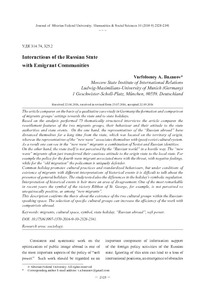Показать сокращенную информацию
Interactions of the Russian State with Emigrant Communities
| Автор | Bazanov, Varfolomey A. | en |
| Автор | Базанов, В.А. | ru_RU |
| Дата внесения | 2016-10-31T05:25:50Z | |
| Дата, когда ресурс стал доступен | 2016-10-31T05:25:50Z | |
| Дата публикации | 2016-10 | |
| URI (для ссылок/цитирований) | https://elib.sfu-kras.ru/handle/2311/26363 | |
| Аннотация | The article compares on the basis of a qualitative case study in Germany the formation and comparison of migrants groups’ settings towards the state and to state holidays. Based on the analysis performed 75 thematically structured interviews the article compares the resettlement features of the two migrants groups, their behaviour and their attitude to the state authorities and state events. On the one hand, the representatives of the “Russian abroad” have distanced themselves for a long time from the state, which was located on the territory of origin, whereas the representatives of the “new wave” associates themselves with (post) soviet cultural system. As a result one can see in the “new wave” migrants a combination of Soviet and Russian identities. On the other hand, the state itself is not perceived by the “Russian world” in a hostile way. The “new wave” migrants often just transferred their cautious attitude to the origin state to the local state. For example the police for the fourth wave migrant associated more with the threat, with negative feelings, while for the “old migration” the policeman is uniquely defender. Common holiday promotes cultural practices and standardized behaviours, but under conditions of existence of migrants with different interpretations of historical events it is difficult to talk about the presence of general holidays. The study tested also the differences in the holiday’s symbolic regulation. Interpretation of historical events is heir more an area of disagreement. One of the most remarkable in recent years the symbol of the victory Ribbon of St. George, for example, is not perceived so unequivocally positive, as among “new migrants”. This description confirms the thesis about the existence of the two cultural groups within the Russian-speaking space. The selection of specific cultural groups can increase the efficiency of the work with compatriots abroad | en |
| Аннотация | В статье на основе материалов качественного социологического исследования проводится анализ формирования и сопоставление установок выделенных групп мигрантов по отношению к государству, к государственным праздникам. На основе анализа проведенных 75 тематически структурированных интервью автор сравнивает особенности переселения двух групп, их поведение, отношение к органам власти. Основой различия двух эмигрантских сообществ служит различия в идентичности и цели их пребывания вне страны происхождения. Представители «русского зарубежья» длительное время дистанцировались от государства, которое располагалось на территории исхода, что не в такой степени характерно для представителей «новой волны». При этом само государство как таковое не воспринимается враждебно. Настороженное отношение к государству мигрантов «новой волны» часто переносится на государство приема. Заметны различия в символической регуляции праздников. Интерпретация исторических событий является скорее областью разногласий. Примером использования символов может служить акция «георгиевская ленточка», которая, несмотря на присутствие общего исторического основания, не стала общим символом. Переселенцы из нашей страны являются важным ресурсом «мягкой силы», помогающей улучшению имиджа России. Выделение особенностей культуры и восприятия символов каждой группы может повысить эффективность работы с соотечественниками за рубежом | ru_RU |
| Язык | en | en |
| Издатель | Сибирский федеральный университет. Siberian Federal University. | en |
| Тема | migrants | en |
| Тема | cultural space | en |
| Тема | symbol | en |
| Тема | state holiday | en |
| Тема | “Russian abroad” | en |
| Тема | soft power | en |
| Тема | мигранты | ru_RU |
| Тема | культурное пространство | ru_RU |
| Тема | символ | ru_RU |
| Тема | праздник | ru_RU |
| Тема | «русский мир» | ru_RU |
| Тема | «мягкая сила» | ru_RU |
| Название | Interactions of the Russian State with Emigrant Communities | en |
| Альтернативное название | Взаимодействие Российского государства с эмигрантскими сообществами | ru_RU |
| Тип | Journal Article | |
| Тип | Published Journal Article | |
| Контакты автора | Bazanov, Varfolomey A.: Moscow State Institute of International Relations Ludwig-Maximilians-University of Munich (Germany) 1 Geschwister-Scholl-Platz, München, 80539, Deutschland; E-mail : v.a.bazanov@gmail.com | en |
| Контакты автора | Базанов, В.А.: Мюнхенский университет Людвига-Максимилиана Германия, 80539, Мюнхен, Гешвистер-Шолль-Плац 1 | ru_RU |
| Страницы | 2328-2341 | |
| Журнал | Журнал Сибирского федерального университета. Гуманитарные науки. Journal of Siberian Federal University. Humanities & Social Sciences;2016 9 (10) | en |

